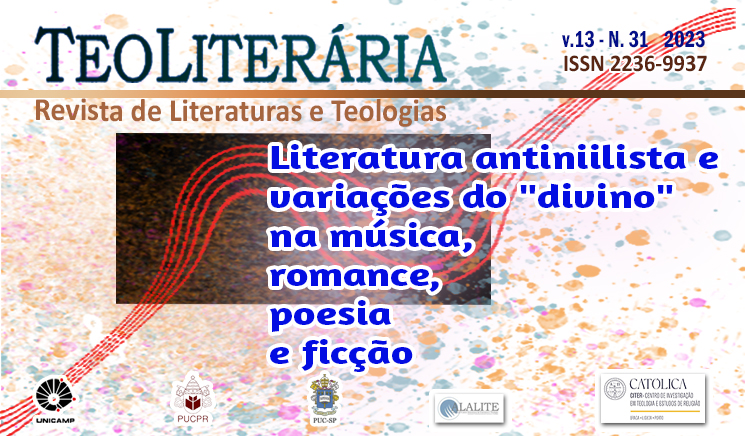Tolstoy and the writing of nihilism
DOI:
https://doi.org/10.23925/2236-9937.2023v31p54-72Keywords:
Tolstoy, Philosophy, Anti-nihilism, Art, NihilismAbstract
The article analyzes the presence and significance of nihilism in Tolstoy’s art and thought. I argue that Jacobi’s philosophical criteriology, his definition of idealism as a nihilism, reaches the essence of what can be called “Tolstoy’s nihilism”, shedding light on a writing that translated, simultaneously, the nihilism and anti-nihilism of the thinker and artist of Iasnaia Poliana. In the same way, I argue that the narcissism that inhabits idealism found in the writing of the Russian novel an experience of interruption that sought, as we find in Tolstoy’s writing, to go beyond the excesses of a consciousness incapable of going outside itself. Finally, I argue that the conflicts between art and philosophy, which remained uninterruptedly present in Tolstoy’s work, should be read in the light of the rootlessness of Russian modernity, the excesses of a consciousness embodied in his Hamlets, and in the quixotic search, which is the anti-nihilist principle of the Russian novel, for a truth that lies outside the isolated person
References
ALVAREZ, A. A visit with Ingmar Bergman. The New York Times, Nova York, 7 dec. 1975. Disponível em: https://www.nytimes.com/1975/12/07/archives/a-visit-with-ingmar-bergman-the-great-swedish-film-director-is-not.html. Acesso em: 19 dez. 2023.
AUERBACH, E. Mimesis: a representação da realidade na literatura ocidental. São Paulo: Perspectiva, 1971.
BAKHTIN, M. Notas sobre literatura, cultura e ciências humanas. Organização, tradução, posfácio e notas: Paulo Bezerra. Notas da edição russa: Serguei Botcharov. São Paulo: Editora 34, 2017.
BENSUSSAN, G. De la circoncision comme philosophème. Les Cahiers philosophiques de Strasbourg, Estrasburgo, n. 39, p. 43-57, 2016. Disponível em: https://journals.openedition.org/cps/319. Acesso em: 19 dez. 2023.
BENSUSSAN, G. La philosophie est un nihilisme. Teoliterária. São Paulo, v. 13 n. 31, 2023.
BERDIAEV, N. Esprit et liberte: essai de philosophie chrétienne. Paris: Les Éditions “Je sers”, 1933.
CHESTOV, L. L’homme pris au piège: Pouchkine – Tolstoï – Tchekhov. Paris: Union générale d’éditions, 1966.
DERRIDA, J. Essa estranha instituição chamada literatura: uma entrevista com Jacques Derrida. Belo Horizonte: UFMG, 2014.
DERRIDA, J. Glas. Paris: Galilée, 1974.
DE VOGUÉ, E.-M. Le roman Russe. Paris: Librairie Plon, 1886.
DOSTOIÉVSKI, F. Memórias do subsolo. São Paulo: Editora 34, 2009.
DOSTOIÉVSKI, F. Os demônios. São Paulo: Editora 34, 2004.
DOSTOIÉVSKI, F. Púchkin. In: GOMIDE, B. B. (org.). Antologia do Pensamento Crítico Russo. São Paulo: Editora 34, 2013. p. 405-423.
EPSTEIN, M. Post-Atheism: From Apophatic Theology to “Minimal Religion”. In: EPSTEIN, M.; GENIS, A.; VLADIV-GLOVER, S. Russian Postmodernism: New Perspectives on Post-Soviet Culture. Nova York: Berghahn Books, 1999. p. 227-235.
FIGUEIREDO, R. Prefácio. In: TOLSTÓI, L. Infância, adolescência e juventude. São Paulo: Todavia, 2018. p. 7-12.
GRIGORIEV, A. Tolstoy’s negation and praise for the “submissive” type of personality. In: KNOWLES, A. V. Tolstoy: The Critical Heritage. Boston: Redwood Burn, 1978. p. 69-72.
GUSTAFSON, R. Leo Tolstoy, resident and stranger. Princeton: Princeton University Press, 1986.
HEGEL, G. W. F. Enciclopédia das ciências filosóficas em compêndio: Filosofia da Natureza. São Paulo: Loyola, 1997.
HEIDEGGER, M. “!Alma mía!”: Cartas de Martin Heidegger a su mujer Elfride (1915-1970). Buenos Aires: Manantial, 2008.
KANT. I. Crítica da Razão Prática. Lisboa: Edições 70, 1989.
KRENAK, A. A vida não é útil. São Paulo: Cia das Letras, 2020.
LÉVINAS, E. La réalité et son ombre. In: LÉVINAS, E. Les imprévus de l’histoire. Montpellier: Fata Morgana, 1994. p. 107-127.
LIÉRMONTOV, M. O herói do nosso tempo. São Paulo: Martins Fontes, 1999.
MEDZHIBOVSKAYA, I. Tolstoy and the religious culture of his time: a biography of a long conversion (1845-1885). Lanham: Lexington Books, 2008.
NABOKOV, V. Lições de literatura russa. São Paulo: Três Estrelas, 2014.
ORWIN, D. Consequences of Consciousness: Turgenev, Dostoevsky, and Tolstoy. Redwood City: Stanford University Press, 2007.
ORWIN, D. Tolstoy’s art and thought: 1847-1880. Princeton: Princeton University Press, 1993.
ROUSSEAU, J.-J. O Contrato Social. Queluz de Baixo: Presença, 2010.
SUDÁRIO CABRAL, J. Dostoevsky and Religious Aesthetics: apophaticism and nihilism. Teoliterária, São Paulo, v. 8, n. 16, p. 46-60, 2018. Disponível em: https://revistas.pucsp.br/index.php/teoliteraria/article/view/40650. Acesso em: 19 dez. 2023.
TCHAADÁIEV, P. Primeira Carta Filosófica (1836). In: GOMIDE, B. B. (org.). Antologia do Pensamento Crítico Russo. São Paulo: Editora 34, 2013. p. 65-85.
TOLSTÓI, L. [В чём моя вера?] Полное собрание сочинений. Том 23. Москва, 1957.
TOLSTÓI, L. [Дневники и записные книжки 1854–1857] Полное собрание сочинений. Том 47. Москва, 1937.
TOLSTÓI, L. Guerra e Paz. São Paulo: Companhia das Letras, 2017.
TOLSTÓI, L. Infância, Adolescência e Juventude. São Paulo: Todavia, 2018.
TURGUÊNIEV, I. Hamlet e Dom Quixote. In: TURGUÊNIEV, I. Pais e filhos. Tradução e apresentação: Rubens Figueiredo. São Paulo: Companhia das Letras, 2019.
TURGENEV, I. The Essential Turgenev. Evanston: Northwestern University Press, 1994
WEIL, S. [Réponse une letter d’Alain]. Sur la science. Paris: Gallimard, 1966.
Published
How to Cite
Issue
Section
License
Copyright (c) 2023 TEOLITERARIA - Revista de Literaturas e Teologias

This work is licensed under a Creative Commons Attribution 4.0 International License.
TeoLiteraria – Journal of Literatures and Theologies owns the copyright of all published material. The whole reproduction of the articles of this Journal in other publications or for any other purpose, by any means, requires a written permission of the editor of this journal. Partial reproductions of articles (abstracts, more than 500 words text, tables, figures and other illustrations) must have a permission written by the publisher and the authors.

